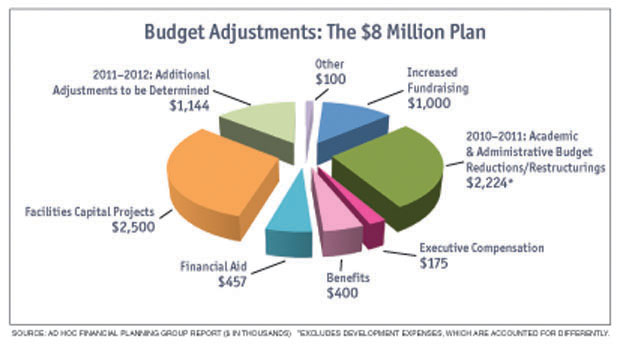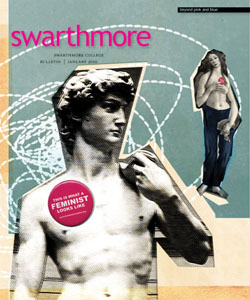Managers Approve $8 Million in Budget Adjustments
 The Board of Managers has approved an $8 million package of budget adjustments recommended by the Ad Hoc Financial Planning Group intended to return the College to financial sustainability over the next three to five years.
The Board of Managers has approved an $8 million package of budget adjustments recommended by the Ad Hoc Financial Planning Group intended to return the College to financial sustainability over the next three to five years.
The action, taken at the Managers’ December meeting, comes in response to the decline in the value of the College’s endowment caused by the historic market downturn that began in 2008.
About $6.9 million in adjustments will be implemented beginning with the 2010–2011 fiscal year. Several options are under consideration for the remaining $1.1 million. Final decisions on these will be made next year. There will be no staff layoffs, and the College remains steadfast in its commitment to need-blind admissions.
“We started our budget adjustment process in fall 2008, when the full impact of the market collapse became apparent,” said Vice President of Finance and Treasurer Suzanne Welsh. “Because Swarthmore has one of the nation’s highest endowment-per-student ratios, our budget is heavily endowment dependent.”
Swarthmore has the 12th-highest endowment per student in the country. In recent years, it has provided about half of the College’s budgeted revenues.
President Rebecca Chopp commented in an interview that all of higher education—especially institutions such as Swarthmore with large endowments—“will take a more restrained, tempered, careful approach to how we spend resources, when we add programs, and where we add staff. Like the rest of American culture, we’ve come to appreciate that simple living may be very good for us in higher education.”
The recommendations were developed by the Ad Hoc Financial Planning Group appointed by the Board in March 2009. The group was chaired by Board Chair Barbara Mather ’65 and included three other Managers, President Rebecca Chopp and eight senior administrators, four members of the faculty, and two staff members. A Student Financial Advisory Panel formed by Student Council in fall 2009 also weighed in on the recommendations.
Salem Shuchman ’84, a member of the Ad Hoc Group and vice chair of the Board’s Investment Committee, commented on the situation that Chopp faced on taking office last July: “Talk about an amazing crash course in Swarthmore! It’s been a pretty tough position, but in hindsight, it will hold her in good stead. If you want to get to know a college, there’s nothing like going through its budget line by line.”
Consulting widely with the College community, the planning group took eight months to formulate its recommendations. Rather than make across-the-board reductions, the group suggested calibrated cuts guided by five principles:
• preserve the College’s academic excellence
• protect need-blind admissions and access for qualified students from all economic backgrounds
• provide strong support for students
• maintain a commitment to community and shared contributions to the plan
• steward the endowment to achieve intergenerational equity
In the first phase of budget adjustment recommendations made in spring 2009, the College committed to defer all nonessential construction work, to refrain from initiating any new programs, to stringently evaluate any faculty or staff hiring and to freeze the wages of faculty and staff for the next year. In total, the 2009–2010 budget was adjusted by $3.2 million in ongoing reductions, plus an additional $9.1 million in temporary, nonsustainable cuts. The Phase 2, $8 million plan, adopted last month, will replace the temporary actions with longer-term solutions that will close the estimated budget gap and result in a sustainable budget within five years.
The $8 million adjustments will be made throughout the College’s budget, including reductions in administrative and academic departments’ budgets as well as savings realized through a restructuring of employee benefits. The wage and salary freeze has been lifted in next year’s budget.
On the revenue side, the plan foresees additional fundraising support that, at the end of five years, will add $1 million a year to the budget. This will be achieved by designating income from $3.5 million a year in new unrestricted endowment gifts to support the operating budget—plus a $300,000 increase in the Annual Fund goal over five years.

Source: Ad Hoc Financial Planning Group Report ($ in thousands). *Excludes development expenses, which are accounted for differently.
The process of making these budget adjustments was extraordinarily open. Members of the Ad Hoc Financial Planning Group held several campuswide meetings and many smaller workshops with the faculty, staff, and students as it formulated its plans. More than 150 suggestions were submitted to the group through its Web site, and the final set of recommendations was shared with the College community nearly a month before being considered by the Board.
Tom Spock ’78, a member of the Ad Hoc Group and chair of the Board’s Finance Committee, thought that representatives from the faculty and staff had the most difficult role in the deliberations. “They did the heavy lifting because they have to live on campus with the results of their recommendations. The faculty and staff were often caught between their peer groups and the responsibility to make good decisions for the future of the school. They performed a great service to the College.”
Associate Professor of Sociology Sarah Willie-LeBreton, a member of the Ad Hoc Group, said that she felt as a faculty member that “our governance responsibility is most serious regarding the academic program.” In addition to presentations at faculty meetings, she and the three other faculty members in the Ad Hoc Group held a series of small workshops for faculty, where she said they found a variety of competing ideas: “It’s hard stuff,” Willie-LeBreton said. “Everyone’s working together, but it’s almost impossible to come to agreement in such a short time on what the contours of the academic program should look like.”
Mary Marissen, a technical services specialist at McCabe Library who served on the Ad Hoc Group, said: “At times I did feel caught; I tried to broaden peoples’ perspective. This was a zero-sum game, and there had to be some shared contributions, but our being at the table was a measure of how staff are incorporated into the life of the College.”
“This was an extraordinary experience for the College to go through, and we emerged even stronger than before the crisis began,” President Chopp said in a Bulletin interview after the Board meeting. “Although there were many difficult choices made along the way, I’ve never been involved with a community so committed to meaningful collaboration and to ensuring that its core mission was protected and preserved. I’m deeply grateful to all members of the campus community who contributed their time, energy, and expertise—and to alumni, who continue to provide both volunteer service and financial support to the College in such significant, ongoing ways.”
 Email This Page
Email This Page